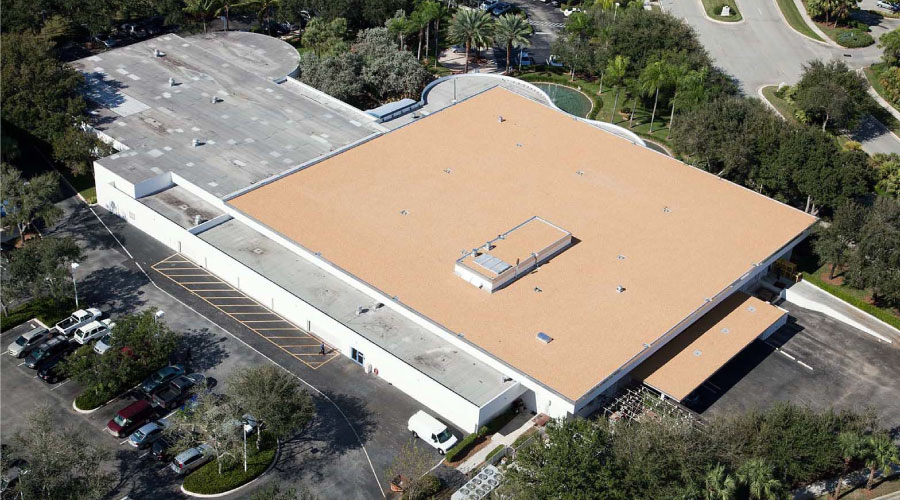Some Roof Coatings Perform Well in Ponding Water
Part 3 of a 4-part article on roof coating myths
Some coatings actually perform well in ponding water. Manufacturers selling roll goods — modified and single-ply systems — specify no ponding water after a day or two as a limitation of the product. It is best practice to eliminate ponding water for many reasons. When tearing off and replacing a roof, this is easily done with a new taper system, which can be a costly part of a reroofing project.
When it comes to fluid-applied roof systems, managers have to work with the roof system as it is. After all, these products are being installed directly to the surface of the existing roof. Whether ponding water is present or not, the potential exists when restoring a flat roof. Why not use a system that is designed to withstand ponding water?
Acrylic, water-based coatings break down under ponding water over time. If it rains often and ponds remain for extended periods, these areas eventually will fail. Solvent-based systems are a solid solution these days with some of the hybrid, dual-chemistry systems providing the best protection.
Myth: I can’t get an FM coating
Yes, managers can, but they have to be careful. Factory Mutual (FM) approvals are for complete systems, which include everything from the roof deck to the top of the coating system. If an insurance carrier requires an FM-rated system, the existing roof system already should be an FM system. It was tested and approved by Factory Mutual as a system.
That new roof coating has to be tested the same way. The new coating and the current system have to be tested together to receive an FM approval. The selected manufacturer and contractor should be able to provide FM approvals.
Myth: Anyone can install a coating
This is not true. Most manufacturers require that their contractors be approved to install their coating systems. While there might be a material warranty for the stuff in the bucket, to get a labor and material warranty, the manufacturer should approve the contractor.
The approval process varies by manufacturer, so managers need to ask the contractor for a certificate and verify with the manufacturer that the desired warranty is available from the chosen contractor. It is far better to ask questions before a project starts than to find out after it is completed that the contractor cannot deliver a warranty.
Managers must ask the contractor to explain the proposal, and not get just the customary three bids and choose the lowest price. The lowest bid might not be the most qualified bid.
They need to review each proposal and weigh it against the price. A significant difference exists between painting a roof white and installing an energy saving, coating system that extend’s a roof’s service life. Managers must choose wisely because the selected roof coating typically is a 10- to 20-year investment and their only chance to make a smart choice.
This article was provided on behalf of the Roof Coatings Manufacturers Association — www.roofcoatings.org — by Scott Gayle of American WeatherStar.
Related Topics:















